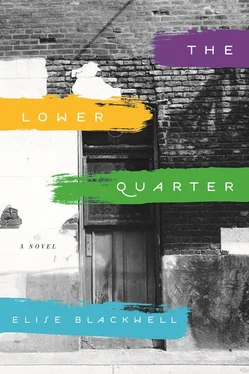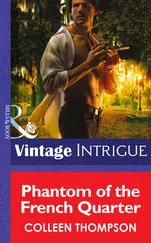“Of course.” Now she smiled again, slumped a little so she could look up through her eyelashes, an approach that might work on a man who lived alone. “Maybe you could leave your card with me? I could call you if I remember anything suspicious, or if I hear anything around the neighborhood.”
He moved his hands from his pockets to his hips, then fingered through his inside coat pocket, extracting a white business card and a scissor-cut rectangle of newspaper. “You didn’t ask me about the painting. How do you know you haven’t seen it?”
“Since you didn’t tell me, I thought maybe that was confidential, too.” She willed an innocent face, a face free of sarcasm and ulterior motive, brows lifted just slightly to widen her eyes, barest smile, blank expression.
“Truth is, I don’t really know.” He shook his head as though remembering something else and left.
She looked down at the pieces of paper in her hand: the card reading “Detective Trey Mouton” with a precinct address and phone number and the photograph of Ladislav she’d seen in the Times-Picayune the day she’d returned, cut from its page with careful scissors.
The photo of his death face looked nothing like her memory of the almost handsome man offering her a way out of a dismal Bratislava apartment that smelled always of reused cooking grease, where she’d been forced to move when her father had finally died at the end of his long decline. She’d been taken in begrudgingly by relatives of her mother who had never approved of her mother’s choice of husband, whose language she understood only partially, who were misers who figured they would be much better off without an extra mouth at their table, particularly such a pretty mouth when they already had a daughter who shared Johanna’s age but not her beauty.
They’d been glad to push her out the door, and — yes — she had been glad to go. “Who lives in a house with no books?” her father had always asked when trying to explain why the happiness of his marriage had been doomed from the beginning, who had tried to explain to Johanna that “Marry your own kind” was not snobbery but just good advice that he should have heeded. “Except,” he would always add, “I wouldn’t trade you for all the happiness in the world.”
Au pair was the term Ladislav had spoken when he’d described the job awaiting her in Belgium, and Johanna had imagined herself reading books to bright children. She could think of no better way to learn new languages that might change her life, might make it more like the life her father had wanted her to inhabit.
To think back to the last time she had had a choice before she had been stripped of her volition was to self-inflict pain, because on that day she had made the wrong one. Each time she thought about the moment she agreed to leave with Ladislav, she remembered it differently, assigned herself a different portion of fault. In some versions Ladislav was a monster and her mother’s relatives beyond redemption while she herself could be forgiven on account of her innocence. In others, her innocence itself was the villain.
When Ladislav first tried to touch her, on the train to Brussels, she’d been flattered and mistaken his retreat for respect when she told him she was a virgin. Or at least for consideration, the idea that it was an economic calculation never occurring to her. She had no idea whatsoever of the story line taking over her life.
She knew soon enough that it was an old story that never goes away, one repeated here and there and everywhere, and she was just another girl with the same tired tale to tell. Yet while the plot claimed many, it was her only story, at least on those days when she was unable to believe the fictional history she had imagined for herself. When confronted with her real autobiography, she tried to comfort herself with the fact that at least she’d avoided a few of its clichés.
Perhaps that was why her sentiments toward Ladislav were less murderous than Clay had always wanted them to be. Ladislav had never hit her in the face, never stuck a needle in her arm, never raped her himself. They’d never even kissed after his aborted attempt at railway seduction. Even if his only motivation had been the financial advantage of her status, and later of running an establishment known for girls who were both beautiful and clean, she knew it could have been worse. She heard other variations on the story, too, from girls who told her that Ladislav’s house was a big step up. For months she’d believed that she could put in her time, attract no complaints, and at last be rewarded with the return of her passport, a modest wallet, and an open door.
The day before she saw Clay for the first time, Ladislav entered her room after dinner, sat down next to her on the narrow bed, tucked a strand of her hair behind her ear with one finger. “There’s a client,” he said quietly, “with particular tastes.”
As he described what might take place, she knew that she would feel fear, later, probably right when she heard the man at her door. “Ordinarily I would assign a more experienced girl, but there are reasons I need you to do this. I can make it worth your while, grant special privileges.”
“Why do you bother asking me this time?”
“I’m not asking, but I’m telling you in advance because he has specifically requested someone who likes this sort of thing.”
“Who could possibly like it?” she asked quietly.
“You would be surprised.” He looked almost sad, almost apologetic. “If you can manage to be convincing, I’ll take two years off your time here.” He grinned then, the spaces between his widely spaced square teeth looking black and opaque.
“Two years,” she whispered, realizing that her situation was much, much worse than she realized if her sentence could be reduced by that much and yet remain. She vowed to change her story, or at least its ending, and it was a promise to herself that she found a way to honor.
Eli
The parade was at once less organized and more cohesive than he’d expected based on his notions of the only holiday he associated with New Orleans: Mardi Gras. Those preconceptions came either from footage he’d seen on a television somewhere or from his own imagination — he wasn’t sure which. This parade was less organized because it wasn’t a real parade but rather a motley collection of strollers, marching clubs, wagons, and bicycles decked out like floats. Yet it was more cohesive because everyone seemed to be a participant; there were no real spectators save he and Johanna, and even they walked along. Many marchers were close to nude, but no bystanders lifted their shirts and screamed to be thrown beads and trinkets. There was seriousness to this revelry, almost purpose. He figured it was the pride of having survived a great natural disaster, of holding ground or at least quickly reclaiming it.
Johanna was indecipherable, unless she was merely miserable but stoic, which was his best guess. Eli found himself softening, his body giving way to the beats, the steps, the very mood of the place. He’d felt cold when the sun faded but warmed quickly with movement. He liked the ridiculous names and costumes of the marching clubs: the Kazoozie Floozies with their plastic dime-store instruments, the Bearded Oysters, the ornately costumed Muffulettas in their ridiculous ruffled skirts. The near-naked men and women on bicycles, saved from possibility of arrest by the odd strategically placed flower or sequined pasty and saved from the descending temperature by liquor or bravado or sheer hardiness. The women in hoop dresses and parasols with their second-line steps that moved sideways and back almost but not quite as much as forward.
Eli and Johanna moved along with the parade but at its outskirts, the crowd often pushing them together and then apart. Once she took his hand, but it felt precautionary, a necessary way for them to maintain their proximity, and soon she dropped it.
Читать дальше












